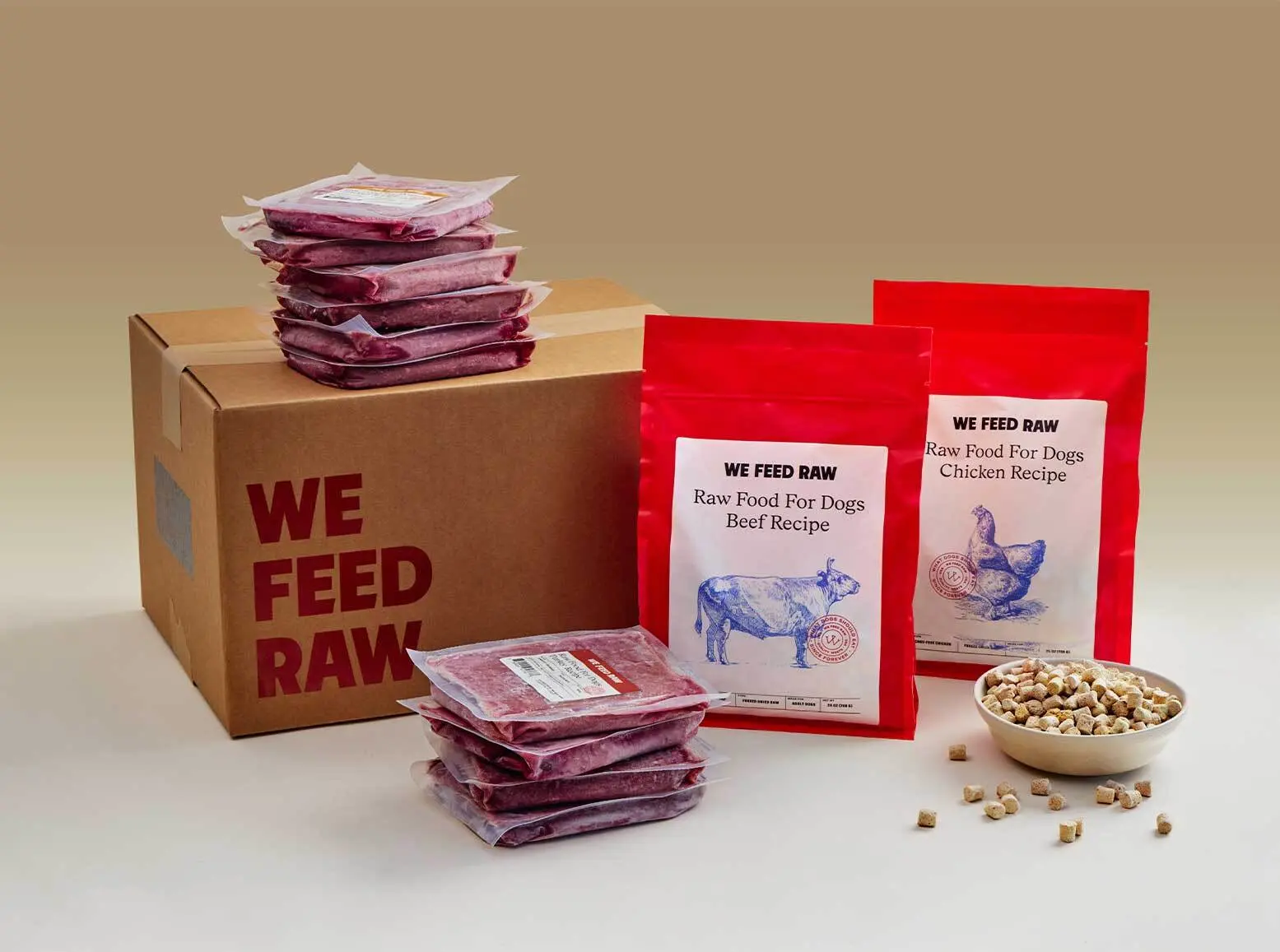
Can Dogs Have Honey? Safe Sweet Treats for Your Pup
Table of Contents
If you have a dog and a sweet tooth, you may be wondering: Can dogs have honey? In short, most dogs can have very small amounts of honey, but puppies, diabetic dogs, pups who are overweight or obese, dogs with compromised immune systems, and pooches who are allergic to bee stings should stay away from honey.
Keep reading to learn more about everything related to dogs and their consumption of honey.
What Is Honey?
Honey is the result of bees preserving nectar for them to eat later in the year when flowering plants aren’t available. It’s made when honey bees collect nectar and store it in their crop (essentially a second stomach), where it mixes with enzymes that help preserve it. The bee then transfers the nectar to a worker bee, who deposits it in a honeycomb and fans it to evaporate excess moisture.
Can Dogs Have Honey?
Most healthy adult dogs can have small amounts of honey every once in a while. How small? Dogs that weigh 20-50 pounds can eat about a teaspoon of honey; smaller dogs should eat less and larger dogs can eat slightly more.
Puppies should not eat honey due to the risk of succumbing to botulism since their young immune system can’t handle the possible botulism spores that can be found in honey. For the same reason, dogs with compromised immune systems should not eat honey.
Due to its high sugar content, dogs who are overweight, obese, or diabetic should not eat honey, either.
Additionally, dogs who are allergic to bee stings may also be allergic to honey. Try feeding a single drop of honey to see how your dog reacts, then gradually increase how much you feed while always looking out for signs of an allergic reaction.
Health Benefits of Honey for Dogs
Even in the small doses safe to share with dogs, raw, unpasteurized honey has some health benefits for dogs. Note that processed or heated honey loses many of these benefits.
Antioxidants
Honey contains vitamins A, C, and E, powerful antioxidants that combat free radicals, boost your dog’s immune system, and help reduce inflammation.
Vitamins and Minerals
In addition to the above-mentioned vitamins A, C, and E, honey also contains B-complex vitamins, vitamins D and E, and fat-soluble minerals like manganese, magnesium, and copper.
Anti-inflammatory Properties
Honey acts as an anti-inflammatory and may help reduce swelling associated with joint pain, bug bites, hot spots, or other wounds.
Antibacterial, Antifungal, and Antimicrobial Properties
When added to food, honey may help eliminate diarrhea-causing bacteria from your dog’s digestive tract. Honey can also be used topically to help heal eczema, hot spots, bug bites, and other types of wounds. Manuka honey from New Zealand contains the highest amount of antibacterial properties.
Seasonal Allergy Relief
If you buy local honey, it may contain small amounts of flower pollen that your dog is allergic to, which can stimulate your dog’s immune system to build antibodies and stop the allergy. Additionally, pollen contains quercetin, which is a polyphenol high in antihistamines and can help relieve your dog’s environmental allergies.
Recommended Honey Consumption for Dogs
One teaspoon of honey contains 70 calories and 17 grams of sugar, which is an appropriate amount for a healthy dog weighing 20-50 pounds. Small dogs should only eat ¼-½ teaspoon of honey per day, while dogs over 50 pounds may be able to eat 2 teaspoons of honey.
Do not give any honey to puppies under 1 year of age, diabetic dogs, obese or overweight dogs, pups with compromised immune systems, or dogs who react to bee stings.
Precautions for Certain Dogs
The following dogs should not eat honey.
Puppies
Raw honey may contain botulism spores that can make puppies sick. Wait until your dog is fully grown (usually at least 1 year old) before giving them honey.
Dogs With Compromised Immune Systems
Due to the same botulism risk that puppies, have, dogs with immune system issues like diabetes, lupus, cancer, or auto-immune diseases should not eat honey.
Overweight or Obese Dogs
Carbohydrates in general and sugar in particular are the biggest contributors to obesity in dogs. If your dog is overweight or obese, stick with lower-sugar treats like pumpkin, cucumbers, and zucchini.
Diabetic Dogs
The high sugar content in honey can raise a diabetic dog’s blood sugar levels too high.
Dogs Allergic to Bees
Dogs who are allergic to bee stings may also be allergic to honey, so if you choose to feed honey to your bee-allergic dog, start with a small drop and keep a keen eye out for signs of an allergic reaction.
Dogs With Bad Teeth
The sugar content of honey can contribute to tooth decay, so you should avoid giving it to dogs who already have dental problems and brush your dog’s teeth at least once a week if you feed them honey to battle any potential tooth decay.
Incorporating Honey into Your Dog's Diet
Giving your dog honey can be as simple as letting them lick it off a spoon or drizzling it over their food. You can also smear honey on other tasty treats or mix it with peanut butter, then spread the mixture inside a Kong and freeze it for a delicious frozen treat.
You can also use honey to sweeten home-baked treats for your dog, but keep in mind that the cooking process will destroy many of the honey’s nutrients, so you might instead choose to spread it on top of the treat after it’s been baked.
Beyond Honey: Raw Dog Food Is Best
Since you’re asking if dogs can eat honey, you obviously want the very best for your dog. And the very best dog food is a complete and balanced raw diet for dogs like We Feed Raw.
Studies show that puppies fed a raw diet are less likely to suffer from ear infections, skin allergies, and digestive issues when they grow up compared to kibble-fed puppies. Other benefits of a raw diet include smaller poop, shinier fur, cleaner teeth, more mealtime excitement, better weight control, and a stronger immune system.
Learn more about We Feed Raw or get started on a meal plan now.
Frequently Asked Questions (FAQs)
Can a dog have honey?
Yes, a dog can have a small amount of honey now and then as long as it is a healthy adult dog of a normal weight who isn’t allergic to bee stings.
Can dogs eat honey?
Yes, dogs can eat honey as long as they are not puppies, immune-compromised, diabetic, overweight, obese, or allergic to bee stings.
Can dogs have raw honey?
Yes, dogs can have raw honey as long as they are healthy adults who don’t struggle with their weight or have bad reactions to bee stings.
Can my dog have honey?
Yes, your dog can have honey as long as it is fully grown, doesn’t have any health problems, isn’t overweight or obese, and isn’t allergic to bee stings.
Boost Your Dog’s Nutrition With Raw Dog Food
Discover the holistic approach to your furry friend's health with We Feed Raw. By now, you understand the potential benefits and precautions when it comes to incorporating honey into your dog's diet. But what about their daily nutritional needs? A raw diet from We Feed Raw can be the cornerstone of your dog's wellness, providing them with all the natural vitamins, minerals, and enzymes they need, much like the goodness found in raw honey.
At We Feed Raw, we specialize in creating complete and balanced meal plans tailored to your dog's specific needs and size–without any of the risks associated with feeding honey to certain dogs. Our carefully crafted raw diet can help promote a robust immune system, maintain a healthy weight, and support overall vitality, which is just what you're aiming for when considering honey as a supplement.
Take the next step in ensuring your dog's optimum health. Click to explore how We Feed Raw's personalized meal plans can enhance your dog's well-being and bring excitement back to their mealtime. Invest in your dog's health today and witness the transformation that a balanced raw diet can bring into their lives. Visit wefeedraw.com to get your dog started on the path to vitality.

Our Meals Change Lives.
(Theirs + Yours.)
See health improvements from our raw meals in as little as 1 week.
